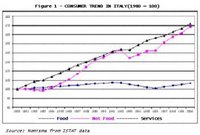Wk5 Reading (Friedman)
Friedman, T. Chapter 2: "Ten forces that flattened the world." Section 7: "Supply chaining." The World is Flat: A brief history of the twenty-first century." In The World is Flat.
Key points from the chapters...
 :: Resourcefulness versus opportunity
:: Resourcefulness versus opportunity
When faced with difficult situations a business will innovate and teach the industry something. Also; a business without scarcity, in a partial monopoly, or in a comfortable market placement does not have motivation to change or innovate. I think this principle is pretty unilateral: generations with hardship or turmoil will make change; those in history with "new money" are much more likely to make change. Friedman's example delt with distribution of merchandise and dealing with wholesalers by the Wal-Mart corporation.
:: Small efficiencies via technology
Using enhanced communication, a business is able to identify more instances when it could be more efficient or cut costs. Communication allows various "disciplines" within a business or industry to meet minds and find opportunity. However, it takes a certain degree of faith in this concept in order to leap the set-up costs, monetary or operational.
 :: Smart products and meta data
:: Smart products and meta data
In the supply chain merchandise can be fitted with a microchip. Each product (or at least each palette) can then become an "object" (as in object-oriented programming) within a meta data system. This way the merchandise can "know" facts (properties) about itself then respond to and inform the organizational system (behaviors.) Smart products offer shipping, stocking, timeline, and other benefits.
What are the implications for the US economy and position in the world?
:: Adoption is a necessity
Resistance is futile. A place in the business world is solidified by adoption and innovation. This becomes more profoundly true the more technology grows. As a result, corporate success is less through national economic stability and more individualized to the organization. This phenomenon has a trickle down effect; personal success and job security is less about old archetypes of a career and more about individual skill improvement and personal marketability. Hence, this class.
 :: Catch-22, Hegemony, Tiny gains
:: Catch-22, Hegemony, Tiny gains
"Demand models," anticipation techniques and trend analysis makes meta data key in highly competitive markets. In order to maintain a position of knowledge and business leadership, the United States must spend more in order to manage and maintain the techniques of leadership that it has created.
Points of contention...
:: The cost of supply-chaining may make it difficult to operate in depressed economies.
:: It's tools may empower the manufacturers (as they adopt them) to leverage back against Wal-Mart.
:: Just like Wal-Mart couldn't foresee the backlash from globalization, impersonalization and efficiency cost cuts, Friedman didn't foresee that we would backlash his "flat" metaphor quite so viscously.
Key points from the chapters...
 :: Resourcefulness versus opportunity
:: Resourcefulness versus opportunityWhen faced with difficult situations a business will innovate and teach the industry something. Also; a business without scarcity, in a partial monopoly, or in a comfortable market placement does not have motivation to change or innovate. I think this principle is pretty unilateral: generations with hardship or turmoil will make change; those in history with "new money" are much more likely to make change. Friedman's example delt with distribution of merchandise and dealing with wholesalers by the Wal-Mart corporation.
:: Small efficiencies via technology
Using enhanced communication, a business is able to identify more instances when it could be more efficient or cut costs. Communication allows various "disciplines" within a business or industry to meet minds and find opportunity. However, it takes a certain degree of faith in this concept in order to leap the set-up costs, monetary or operational.
 :: Smart products and meta data
:: Smart products and meta dataIn the supply chain merchandise can be fitted with a microchip. Each product (or at least each palette) can then become an "object" (as in object-oriented programming) within a meta data system. This way the merchandise can "know" facts (properties) about itself then respond to and inform the organizational system (behaviors.) Smart products offer shipping, stocking, timeline, and other benefits.
What are the implications for the US economy and position in the world?
:: Adoption is a necessity
Resistance is futile. A place in the business world is solidified by adoption and innovation. This becomes more profoundly true the more technology grows. As a result, corporate success is less through national economic stability and more individualized to the organization. This phenomenon has a trickle down effect; personal success and job security is less about old archetypes of a career and more about individual skill improvement and personal marketability. Hence, this class.
 :: Catch-22, Hegemony, Tiny gains
:: Catch-22, Hegemony, Tiny gains"Demand models," anticipation techniques and trend analysis makes meta data key in highly competitive markets. In order to maintain a position of knowledge and business leadership, the United States must spend more in order to manage and maintain the techniques of leadership that it has created.
Points of contention...
:: The cost of supply-chaining may make it difficult to operate in depressed economies.
:: It's tools may empower the manufacturers (as they adopt them) to leverage back against Wal-Mart.
:: Just like Wal-Mart couldn't foresee the backlash from globalization, impersonalization and efficiency cost cuts, Friedman didn't foresee that we would backlash his "flat" metaphor quite so viscously.

0 Comments:
Post a Comment
<< Home